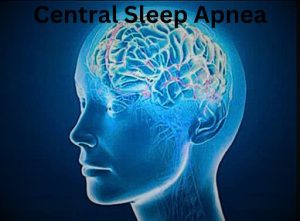Central Sleep Apnea
Central sleep apnea is a sleep disorder in which breathing stops over and over during sleep.
Causes
Central sleep apnea results when the brain temporarily stops sending signals to the muscles that cause breathing.
The condition often occurs in people who have certain medical problems. For example, it can develop in someone who has a problem with an area of the brain called the brainstem, which controls breathing.
Conditions that can cause or lead to central sleep apnea include:
Problems that affect the brainstem, including brain infection, stroke, or conditions of the cervical spine (neck)
Certain medicines, such as narcotic painkillers
Being at high altitude
If the apnea is not associated with another disease, it is called idiopathic central sleep apnea.
A condition called Cheyne-Stokes respiration can affect people with severe heart failure and can be associated with central sleep apnea. The breathing pattern involves alternating deep and heavy breathing with shallow, or even not breathing, usually while sleeping.
Central sleep apnea is not the same as obstructive sleep apnea. With obstructive sleep apnea, breathing stops and starts because the airway is narrowed or blocked. Central sleep apnea and obstructive sleep apnea can be present in the same person.
Symptoms
People with central sleep apnea have episodes of disrupted breathing during sleep.
Other symptoms may include:
Chronic fatigue
Daytime sleepiness
Morning headaches
Restless sleep
Other symptoms may occur if the apnea is due to a problem with the nervous system. Symptoms depend on the parts of the nervous system that are affected and may include:
Shortness of breath
Swallowing problems
Voice changes
Weakness or numbness throughout the body
Exams and Tests
Your health care provider will perform a physical exam. Tests will be done to diagnose an underlying medical condition. A sleep study (polysomnography) can confirm sleep apnea.
Other tests that may be done include:
Echocardiogram
Lung functiontesting
MRIof the brain, spine, or neck
Blood tests, such as arterial blood gas levels
Treatment
Treating the condition that is causing central sleep apnea can help manage symptoms. For example, if central sleep apnea is due to heart failure, the goal is to treat the heart failure itself.
Devices used during sleep to aid breathing may be recommended. These include nasal continuous positive airway pressure (CPAP), bilevel positive airway pressure (BiPAP), or adaptive servo-ventilation (ASV). Some types of central sleep apnea are treated with medicines that stimulate breathing.
Oxygen treatment may help ensure the lungs get enough oxygen while sleeping.
If narcotic medicine is causing the apnea, the dosage may need to be lowered or the medicine changed.
The FDA has approved a medical device (remedy system) to treat central sleep apnea. The device is implanted in the chest. When a breathing pause is detected, the device stimulates the nerve that controls the breathing muscles so that you will breathe.
Outlook (Prognosis)
How well you do depends on the medical condition causing central sleep apnea.
The outlook is usually favorable for people with idiopathic central sleep apnea.
Possible Complications
Complications may result from the underlying disease causing the central sleep apnea.
When to Contact a Medical Professional
Contact your provider if you have symptoms of sleep apnea. Central sleep apnea is usually diagnosed in people who are already severely ill.
Alternative Names
Sleep apnea, central; Obesity, central sleep apnea; Cheyne-Stokes: central sleep apnea; Heart failure: central sleep apnea

